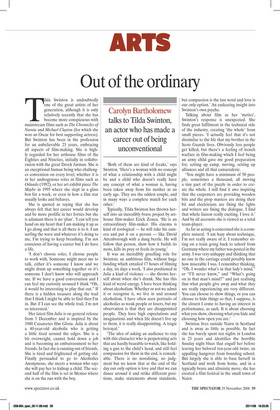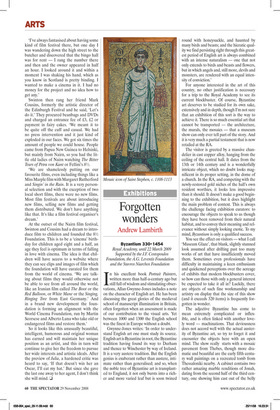Out of the ordinary
Tilda Swinton is undoubtedly one of the great artists of her generation, although it is only relatively recently that she has become more conspicuous with mainstream films such as The Chronicles of Narnia and Michael Clayton (for which she won an Oscar for best supporting actress). But Swinton has been in the profession for an unbelievable 23 years, embracing all aspects of film-making. She is highly regarded for her arthouse films of the Eighties and Nineties, initially in collaboration with the great Derek Jarman. She is an exceptional human being who challenges convention on every level, whether it is in her androgynous roles in films such as Orlando (1992), or her art exhibit piece The Maybe in 1995 where she slept in a glass box for a week, or even in how a film star usually looks and behaves.
She is quoted as saying that she has always felt that her career would develop and be more prolific in her forties but she is adamant there is no ‘plan’. ‘I can tell you hand on my heart that I am making it up as I go along and that is all there is to it. I am surfing the wave and whatever it’s doing to me, I’m trying to keep breathing. I’m not conscious of having a career but I do have a life.
‘I don’t choose roles, I choose people to work with. Someone might meet me to talk, either it’s someone I know and we might drum up something together or it’s someone I don’t know who will approach me. If we have a good conversation and I can feel my curiosity aroused I think “Oh, it would be interesting to play that out.” If there is a hidden treasure along the trail that I think I might be able to find then I’m in. But if I can see the whole trail, I’m not so interested.’ Her latest film Julia is on general release from 5 December and is inspired by the 1980 Cassavetes film Gloria. Julia is about a 40-year-old alcoholic who is getting a little tired around the edges. She is a bit overweight, cannot hold down a job and is becoming an embarrassment to her friends. In fact she is running out of friends. She is tired and frightened of getting old. Finally persuaded to go to Alcoholics Anonymous, she meets a woman who says she will pay her to kidnap a child. The second half of the film is set in Mexico where she is on the run with the boy. ‘Both of them are kind of freaks,’ says Swinton. ‘Here’s a woman with no concept of what a relationship with a child might be and a child who doesn’t really have any concept of what a woman is, having been taken away from his mother at an early age. They are the oddest couple, and in many ways a complete match for each other.’ Typically, Tilda Swinton has thrown herself into an incredibly brave project by arthouse film-maker Erick Zonca. ‘He is an extraordinary film-maker. His cinema is kind of zoological — he will take his camera and put it on a person — like David Attenborough with a dung beetle. He will follow that person, show how it builds its nests, kills its prey or feeds its young.’ It was an incredibly gruelling role for Swinton; an ambitious film, without huge funding which entailed 17 hours of filming a day, six days a week. ‘I also positioned in Julia a kind of violence — she throws herself about when she’s drunk. She has this kind of weird energy. I have been thinking about alcoholism. Whether or not we admit it or recognise it, we live in and around alcoholism. I have often seen portraits of alcoholics as weak people or losers, but my observation is that they are disappointed people. They have high expectations and imaginations and when life doesn’t live up to them, it is really disappointing. A tragic betrayal.’ ‘The idea of asking an audience to stay with this character who is perpetrating acts that are hardly bearable to watch, like holding a gun to the child’s head, and still feel compassion for them in the end, is remarkable. There is no moralising, no judgment but we know that at the end of the day our only option is love and that we can dance around it and strike different positions, make statements about standards, but compassion is the last word and love is our only option.’ An endearing insight into Swinton’s own psyche.
Talking about film as her ‘metier’, Swinton’s response is unexpected. She finds great fulfilment in the technical side of the industry, creating ‘the whole’ from small pieces. ‘I actually feel that it’s not dissimilar to the life that my brother in the Scots Guards lives. Obviously less people get killed, but there’s a feeling of trench warfare in film-making which I feel being an army child gave me good preparation for; setting up camp, moving, setting up alliances and all that camaraderie.
‘You might have a minimum of 50 people, sometimes a thousand, all moving a tiny part of the puzzle in order to create the whole. I still find it awe inspiring that the carpenters are providing wooden bits and the prop masters are doing their bit and electricians are fixing the lights and writers are fixing the dialogue. I find that whole liaison really exciting. I love it.’ And by all accounts she is viewed as a total team-player.
As far as acting is concerned she is a complete natural. ‘I am hazy about technique, I’m not really aware of it. I remember sitting on a train going back to school from Germany where my father was posted in the army. I was very unhappy and thinking that no one in the carriage could possibly know how miserable I was. I remember thinking, “Oh, I wonder what’s in that lady’s mind,” or “I’ll never know,” and “What’s going on in that man’s mind?” and just realising that what people give away and what they are really experiencing are very different. You can choose to show things, or you can choose to hide things so that, I suppose, is the closest I come to having an interest in performance, as such. It is about choosing what you show, choosing what you hide and choosing how open you are.’ Swinton lives outside Nairn in Scotland and is away as little as possible. In fact she has barely spent ten nights in London in 23 years and identifies the horrible Sunday night blues that engulf her before leaving her beloved ten-year-old twins; an appalling hangover from boarding school. But largely she is able to base herself in Scotland and work from home, and in a typically brave and altruistic move, she has created a film festival in the small town of Nairn. ‘I’ve always fantasised about having some kind of film festival there, but one day I was wandering down the high street to the butcher and discovered that the bingo hall was for rent — I rang the number there and then and the owner appeared in half an hour. I looked around it and within a moment I was shaking his hand, which as you know in Scotland is pretty binding. I wanted to make a cinema in it. I had no money for the project and no idea how to get any.’ Swinton then rang her friend Mark Cousins, formerly the artistic director of the Edinburgh Festival and he said, ‘Let’s do it.’ They procured beanbags and DVDs and charged an entrance fee of £3, £2 or payment in fairy cakes. ‘We meant it to be quite off the cuff and casual. We had no press intervention and it just kind of exploded in our faces. We got six times the amount of people we could house. People came from Papua New Guinea to Helsinki, but mainly from Nairn, so you had the little old ladies of Nairn watching The Bitter Tears of Petra von Kant or Fellini’s 81/2.
‘We are shamelessly putting on our favourite films, even including things like a Miss Marple film with Margaret Rutherford and Singin’ in the Rain. It is a very personal selection and with the exception of two local short films, there were no new films. Most film festivals are about introducing new films, selling new films and getting them distributed. We don’t have anything like that. It’s like a film festival organiser’s dream.’ At the outset of the Nairn film festival, Swinton and Cousins had a dream to introduce film to children and founded the 81/2 Foundation. This is to be a ‘cinema’ birthday for children aged eight and a half, an age they feel is optimum in terms of falling in love with cinema. The idea is that children will have access to a website where they can see clips and images of film which the foundation will have curated for them from the world of cinema. ‘We are talking about films they would otherwise not be able to see from all around the world, like an Iranian film called The Boot or the Red Balloon, or White Mane or the Singing, Ringing Tree from East Germany.’ And in a brand new development the foundation is forming an alignment with the World Cinema Foundation, run by Martin Scorsese and Alberto Luna who take old or endangered films and restore them.’ So it looks like this unusually beautiful, intelligent, humorous and original woman has earned and will maintain her unique position as an artist, and this in turn will continue to give her the freedom to pursue her wide interests and artistic ideals. After the preview of Julia, a hardened critic was heard to say, ‘If that doesn’t win her an Oscar, I’ll eat my hat.’ But since she gave the last one away to her agent, I don’t think she will mind. ❑



































































































 Previous page
Previous page